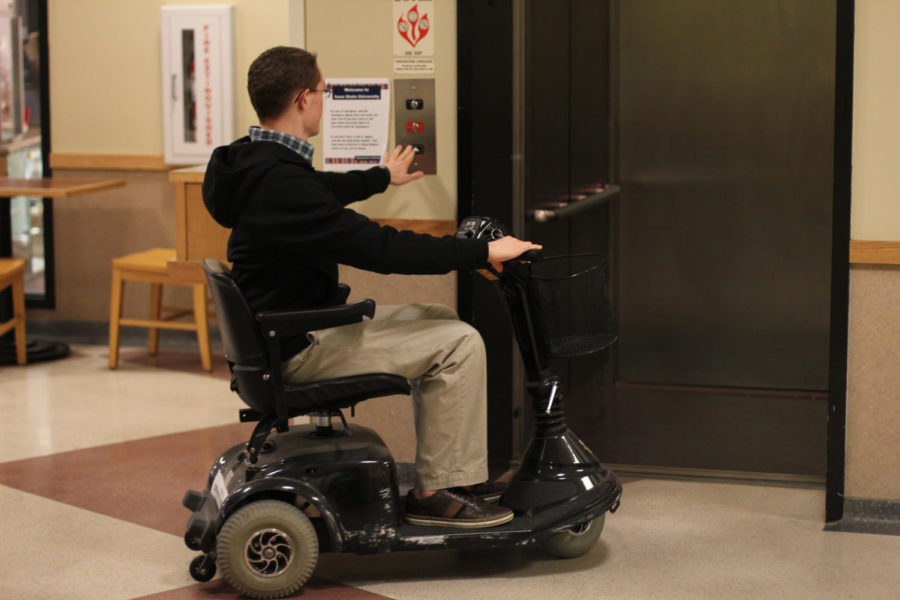Ward: Don’t denounce disabilities
Korrie Bysted/Iowa State Daily
Philip Durkee, graduate student studying student affairs, participates in an event during disability week on Oct. 14. The purpose of the event is to feel what its like to go around campus as a physically disabled student.
October 20, 2014
The best way I can think of to describe this disability would be like taking your biggest secret, the one thing you are truly ashamed of about yourself, and having to wear it on the outside every day for the entire world to see. That was my life for three years starting Oct. 30, 2010. That was the day my life took a turn down a road that would be full of doctors and pills and x-rays and judgment and would ultimately lead to a wheelchair and living with complex regional pain syndrome.
Complex regional pain syndrome is a nervous system disorder that impacts limbs. In my case it was my left foot. This disease will usually present itself after the limb has been through a trauma like a car crash or a severe break, but in cases like mine, that is not necessarily true. I have never been in a car accident, and I have never severely broken anything in my body, which is why no one even began to think that I had CRPS. For one thing, the disorder usually presents itself in adults who have put their bodies through more wear and tear simply due to living longer. I was only 15 at diagnosis, which is why it took six months to finally figure it all out.
Before I was diagnosed, I saw many doctors who entertained many theories as to why my foot felt like it was being repeatedly bashed in with a hammer at all hours of the day. This pain left me unable to put pressure or even a shoe on my foot. I ended up not wearing a left shoe for six months my freshman year of high school. In attempts to return to normalcy, my family and I tried prescriptions, physical therapy, spinal blocks, numbing cream — nothing worked.
During this time, I went from using crutches to using a wheelchair because my shoulders could no longer take the strain of crutches. I had been having symptoms for three months, and that was the icing on the cake. Being in high school is hard. Kids are mean, expectations are high and to throw a wheelchair into the mix essentially gave everyone around me a license to make it harder for me to get out of bed in the morning, mostly because no one truly believed me.
Looking back on the whole ordeal, I get why I got so much flak from my peers about my chair. People had a hard time understanding why I was fine at the start of the school year and then suddenly wheelchair-bound. At this time I was also having operations on my spine because the doctors finally nailed down what disease I was dealing with. To those not close to me, it probably came off as an attention seeking scheme, which only fueled the ridicule. This is especially true because I was in and out of a chair between my freshman and junior years due to surgeries not going as planned. My classmates simply couldn’t understand that.
People I had never even talked to started calling me a liar and a desperate loser milking a sprained ankle or something because they assumed that there was no reason for me to be a wheelchair. It was hard to accept that people would rather make up reasons why I was in a wheelchair than ask me about it. That is why I am speaking out now, four years after I first began my life with CRPS.
When I first began using a chair, I was a freshman and at the time we happened to be reading “To Kill a Mocking Bird“ by Harper Lee in my English class. I think it was a blessing for me personally because one of the main themes of the book is the quote, “You never really understand a person until you consider things from his point of view … Until you climb into his skin and walk around in it.” In my case, one would have had to climb into my skin and roll around in it, but either way I wish someone had tried to see things from my point of view.
Iowa State is a massive campus with people from all walks of life each dealing with a host of different issues that most likely we won’t understand until we talk to them about it. Coping with an injury or disease is a hard enough task on its own without having to also deal with people accusing you of faking the whole thing. We all know what they say about making assumptions, so I implore you to skip the accusation game and just ask the person about it or keep your comments to yourself. I can tell you from personal experience that I would rather have had to explain to someone why I was in a wheelchair than to deal with people calling me a liar simply because they were too afraid to ask me about it directly.







